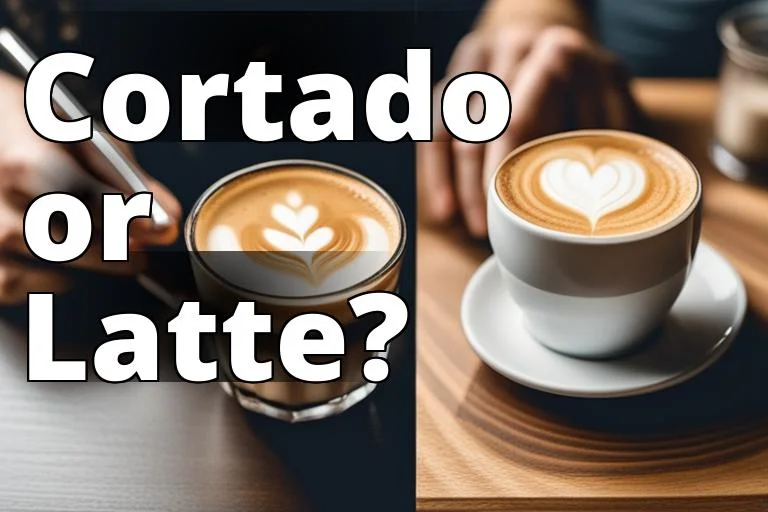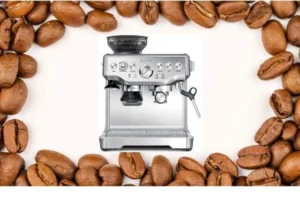Cortado vs Latte: Which One Reigns Supreme in the Coffee World?
Are you a coffee lover trying to decide between a cortado and a latte? These two popular espresso-based drinks may look similar, but they have some distinct differences that set them apart. In this article, we’ll explore the differences in preparation, taste, caffeine content, calories, and the best time to enjoy each drink. By the end, you’ll have a better understanding of cortado vs latte, and which one will suit your taste buds.
Espresso-based drinks are a staple of coffee shops worldwide, with countless variations available. Among the most popular options are the cortado and latte. While both drinks contain espresso and steamed milk, the preparation techniques and ratios differ, resulting in unique flavor profiles.
Key Takeaways
- Distinct Differences: Cortados and lattes differ significantly in prep, taste, caffeine, and calories.
- Cortado Characteristics: Cortados are bold, strong in caffeine, low-calorie, and ideal for mid-mornings or after meals.
- Latte Features: Lattes are mild, versatile, with less caffeine but more calories, suitable for brunch or afternoon enjoyment.
- Personal Preference: Choose cortado for boldness or latte for versatility, or try both to find your favorite.
A Brief Overview
A cortado is a Spanish-inspired drink that consists of a single shot of espresso topped with a small amount of steamed milk. The milk is heated to a lower temperature than in a latte, creating a creamy texture while allowing the espresso’s bold flavor to shine through. On the other hand, a latte is a larger drink made up of espresso and steamed milk. It typically has a layer of foam on top and can be flavored with syrups or sweeteners.
| Drink | Price Range |
| Cortado | $3-$5 |
| Latte | $3-$6 |
Origins of Cortado and Latte
The cortado’s roots can be traced back to Spain, where it’s known as “cortado con leche.” It’s a popular drink in Latin America, where it’s often served with a slice of toast for breakfast. Meanwhile, the latte hails from Italy and is a café latte, which means “milk coffee” in Italian. It’s now enjoyed worldwide and has become a staple of coffee shops everywhere.
Preparation
The cortado is typically prepared by adding a small amount of steamed milk to a shot of espresso, resulting in a 1:1 or 1:2 ratio of milk to espresso. The milk is heated to a lower temperature than in a latte, which results in a creamier texture with no foam. Some baristas may add a small amount of foam to the top for decoration. A latte, on the other hand, is made by combining a shot of espresso with steamed milk, resulting in a 1:3 or 1:4 ratio of milk to espresso. The milk is heated to a higher temperature than in a cortado, creating a layer of foam on top that can be used to create latte art.
Flavor Profile of Cortado and Latte
Cortados are known for their bold and creamy taste, which comes from the combination of espresso and steamed milk. The milk helps to mellow out the acidity of the espresso while still allowing the rich flavor to shine through. Lattes, on the other hand, have a milder and more velvety taste. The larger amount of milk used in a latte means that the espresso flavor is less pronounced, resulting in a smoother and creamier drink. However, this also makes it a more versatile drink, as it can be easily flavored with syrups or sweeteners.
Caffeine Content
Cortados are known for their high concentration of caffeine, thanks to the fact that they’re made with a single shot of espresso. This makes them a great option for a mid-morning pick-me-up or a post-lunch boost. Lattes, on the other hand, have a lower concentration of caffeine. This is because they’re made with more milk than a cortado, which dilutes the espresso. While this may make them a less potent option, it also means that they’re a good choice for those who are sensitive to caffeine.
Calories in Cortado and Latte
Cortados are known for their lower calorie count, as they’re made with a small amount of milk and no added sweeteners. This makes them a good option for those who are watching their waistline. Lattes, on the other hand, can be a bit more indulgent. The larger amount of milk used in a latte means that it has a higher calorie count, especially if sweeteners or syrups are added. However, it’s still possible to enjoy a latte without piling on the calories – simply choose skim milk and skip the sweeteners.
Best Time to Enjoy Cortado and Latte
Cortados are a great choice for a mid-morning break or as a way to cap off a meal. The creamy texture and bold flavor make them a perfect pick-me-up. Lattes are a bit more versatile and can be enjoyed at any time of day. They’re a great choice for a leisurely brunch or as an afternoon treat. The mild flavor and creamy texture make them a perfect comfort drink.
Which One to Choose?
Ultimately, the choice between a cortado and a latte comes down to personal preference. If you prefer a bold and creamy flavor, a cortado is the way to go. If you’re looking for a more mellow and versatile drink, a latte is a great choice. Of course, there’s no need to choose just one. Why not try both and see which one you like best? Or, switch things up depending on your mood and the time of day.
Conclusion
Cortado vs latte is a debate that’s been raging in the coffee world for years. Both drinks have their own unique flavor profiles, caffeine content, and calorie counts. By understanding the differences in preparation, taste, and best time to enjoy them, you can make an informed decision on which drink to choose. So why not experiment with both and decide for yourself which one you prefer?
FAQs
A cortado is an espresso with steamed milk, while a latte has more milk and less espresso.
Those who prefer a stronger coffee taste and less milk would opt for a cortado.
Simply ask the barista for a cortado or latte, specifying any customization you want.
If you want a bolder coffee taste, go for a cortado. If you prefer more milk, opt for a latte.
You’ll need an espresso machine, milk, and a steaming wand. There are many tutorials online.
Prices vary by location, but generally a cortado is cheaper than a latte due to the difference in milk content.








